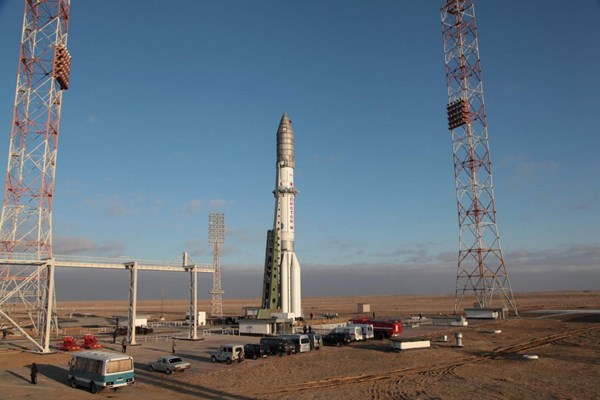Russia is facing more issues with its Proton rockets
Russia has postponed two missile launches into space, Interfax news agency reported, citing its sources.
According to the Russian news agency, the launch of the Proton-M carrier rocket with the US satellite Echostar-21 will be rescheduled for early summer.
"It is already clear that due to unresolved technical issues, it will not be possible to resume launches at the end of May, and the launch of the Proton with the EchoStar 21 satellite will be postponed to at least the beginning of June. Accordingly, the schedule of all other launches of Proton rockets planned for this year will also be postponed," the source said.
The agency also learned that the launch of the manned spacecraft Soyuz MS-07 planned for October from the Baikonur Cosmodrome to the ISS (International Space Station) will be postponed for three months. "The date of the launch will be postponed from October 26 to December 27, 2017," he said. The source indicated that the change in the launch date is connected to the change in the flight schedule.
"The launch is postponed due to the rescheduling of the launch of the previous ship from May 27 to July 28," the source said. "Otherwise, the flight time of the previous ship would be very short."
During the preparation for the launch in December 2016 and formal checks in accordance with the quality assurance program, the specialists found deviations in the rocket engine systems. As a result, the Russian State Commission decided to postpone the launch in order to conduct additional inspections of the engines in the second and third stages of the launch vehicle.
The launches of the Proton carrier rockets were suspended after June 9, 2016, when during the launch of the Intelsat 31 satellite, there were issues noted with the rocket's operation. Specifically, the second stage worked for less than its intended time and its engine switched off prematurely. The launch did not end in a failure only because of a flexible change in the operation of the third stage of the rocket and the Breeze-M upper stage, which successfully brought the spacecraft into orbit.
After several postponements, the restart of the launches was scheduled for the end of 2016, however the failure of the Progress MS-04 cargo spacecraft (December 1, 2016) led to a review of the launch dates for other programs. An additional inspection of the engines made by the Voronezh Mechanical Plant used in the Proton carrier rocket caused an additional postponed of launches, first till February and then till March 2017.
The plans for 2017 envision the launch of two more (in addition to EchoStar 21) commercial satellites, the Amazonas 5 and AsiaSat-9. The launch manifest also includes a launch of the Blagovest satellite by a Proton rocket, which was commissioned by the Russian Ministry of Defense.
The Proton-M launch vehicle and the Breeze-M upper stage are manufactured by the Khrunichev State Research and Production Space Center.
The contract for the launch of the EchoStar 21 satellite with the help of the Proton launch vehicle was signed by the subsidiary company of the MV Khrunichev State Research and Production Space Center, the Russian-American company International Launch Services Inc. (ILS).
The EchoStar 21 is a powerful geostationary communication satellite manufactured by Space Systems / Loral, and was commissioned by one of the world's largest satellite communications operators, EchoStar Corporation (USA). The EchoStar 21 is designed to provide mobile satellite communications services in Europe. EchoStar 21 will become the sixth satellite in the EchoStar orbital group launched using the Proton carrier.
